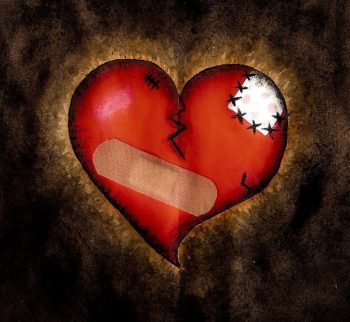Learning About My Emotional Wounds

Just because an emotional wound is invisible doesn’t make it less painful than a physical one. Healing from psychological injuries can be more challenging due to the “Sticks and stones…” mindset many of us have. After all, we chanted it so often as children; we believed the “…words will never hurt me” part. That’s how it was for me. I had no physical wounds to display; therefore, I did not even realize I had been damaged.
By the time I was an adult, I knew that the incestuous acts done to me were wrong, but I still couldn’t see any damage. It wasn’t until my late 20’s that a crisis occurred which brought everything out into the open. At that time, I wrote Scott’s parents a ten-page letter telling them what had happened to me as a child. It became so important to me that others knew because I was tired of feeling like I was living a lie. I had spent so much time and energy trying to appear perfect because I thought every good Christian was perfect.
Scott’s mother, being the sweet Christian woman she is, went to a Christian bookstore looking for something to help me. She found an audio recording of Jan Frank talking about incest and sent it to me. It was an inferior quality recording, which made it difficult for me to understand much of what she was saying on it. I understood enough, though, to go out and buy her book A Door of Hope.
I should pause for just a moment here and say that when I first received the tape in the mail, I was angry. After all, I had long past forgiven my parents. I didn’t need to do anything else, right? I was fine! I laugh now because I remember the look on Scott’s face, as he sat playing with our sweet toddler, and I angrily told him, “I don’t need this! I already forgave my parents. I’m fine!” He very wisely listened quietly and then went on playing with our daughter.
The cassette tape remained on our kitchen counter for about a week before the Lord gently nudged me to listen to it. Once I purchased the book and began pouring through it, my entire perspective changed. I always knew there were things about my behavior that I didn’t like, but it seemed that no matter how hard I tried, I couldn’t successfully change. Once I started to link my unfavorable behaviors as symptoms of past abuse, I actually felt relieved. In her book, Jan talked about how to recover, but the process could be long and painful.
One of the main points Jan made was that it may be necessary to sever ties for a time with the perpetrator if I still had contact with him (117-118). At first, that seemed unforgiving and not Christ-like. Then I came to realize cleaning out emotional wounds requires time away, so the perpetrator does not have the opportunity to heap fresh dirt into the open emotional wound. That became abundantly clear to me the very next time I saw my dad because, true to form, he had some unkind remark about my appearance, which upset me greatly.
I learned that my emotional wounds were open and raw, so any little thing he did or said hurt even more. With my husband’s full support, I informed my father that I would not be seeing him or talking with him indefinitely. Nor would he be allowed to see our 3-year old daughter unless Scott chose to take her over for a short visit. My mother had been totally repentant, so I was comfortable continuing a relationship with her. In response to my decision, my father sent me a letter which began, “If I ever did anything to hurt you…” That said it all. He went to his grave, never admitting his fault. Not long after his death, my mother told me that he had actually sent that same exact letter to my siblings as well.
When I was twelve, I had chosen to forgive my father even though he had not asked for forgiveness. As a young adult woman, I realized I would need to go through the steps of recovery without the perpetrator ever acknowledging his culpable behavior. I also discovered that I needed to make decisions that were best for me without regard to what was best for my father. I needed to clean out my emotional wounds.
Frank, Jan. A Door of Hope: Recognizing and Resolving the Pains of Your Past. Here’s Life Publishers, 1987.
